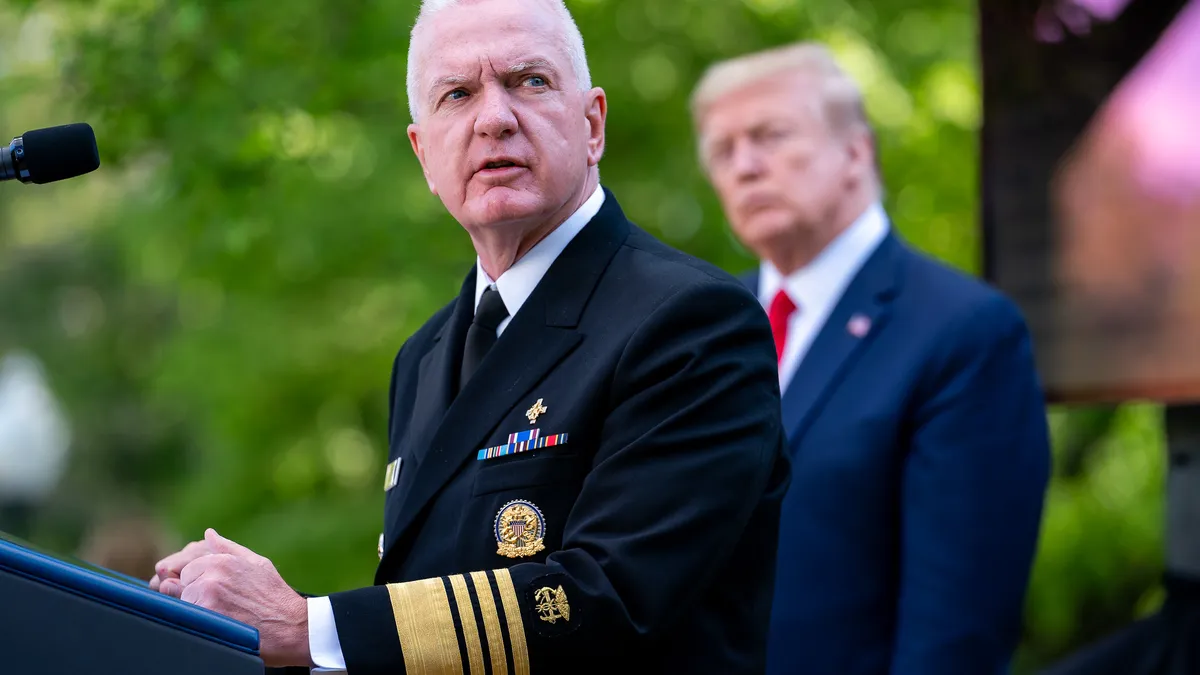Dive Brief:
- The Department of Health and Human Services on Monday afternoon released coronavirus testing plans submitted in July by all 50 states, U.S. territories and a handful of cities outlining plans to scale up — or in many parts of the country, maintain — the number of diagnostic and serological tests run each month.
- Among the requirements for back-half-of-the-year plans due July 10, governors were directed to outline the number of diagnostic and serological tests needed each month, as well as estimates for monthly lab and testing capacity. The plans do not consistently outline the number of manufacturer-specific devices or tests governments have purchased or plan to purchase, although some states note quantities from Abbott, Hologic, Thermo Fisher and a range of other diagnostics companies.
- In the absence of a national testing strategy from the Trump administration, some states are trying to work together on procurement of rapid antigen tests. Maryland Gov. Larry Hogan spearheaded an interstate pact, announced a week ago, that has since added Utah to the group, bringing its current total to eight states with an even split of Republican and Democratic leadership.
Dive Insight:
Last month, The Rockefeller Foundation said the U.S. needs to run 30 million tests per week to safely reopen economies. At the time, that goal represented a more than six-fold increase over existing capacity.
Some state testing plans reflect ambitious scale-ups. For example, Connecticut plans to go from 400,000 monthly diagnostic tests in July to 1 million in December, placing its year-end testing goal among the most ambitious per capita, alongside Washington, New Jersey and Illinois, to name a few. In Maryland, authorities are aiming to double its monthly levels from 300,000 to 600,000 between July and August. And in Massachusetts, there's a goal to more than triple testing from 248,000 in July (a dip from May and June levels) to 775,000 in December.
These targets align with diagnostic manufacturers' bullish predictions for end-of-year gains from coronavirus testing. Hologic pegged fiscal fourth quarter revenue growth anywhere between 6.8% and 18.4%. And antigen test maker Quidel did not give financial guidance, but noted at the end of July that its rapid immunoassay product sales jumped 270% in the recent quarter with demand continuing to outstrip what the company can currently offer.
Many states across different regions of the country — including Georgia, Hawaii, Illinois, Iowa, Kentucky, New Mexico, North Carolina, Ohio, Vermont and Wisconsin — have laid out an incremental, month-by-month approach to scaling up diagnostic testing volumes.
Another group of states — including Arkansas, Florida, Idaho, Mississippi, Montana, Nebraska, New York, Oregon, South Dakota and Utah — plan to keep diagnostic testing levels consistent across the July to December period. In addition, Michigan, Minnesota, New Jersey, Oklahoma, Pennsylvania, Rhode Island, South Carolina, Texas, Virginia and Washington plan to hit a plateau, but not until September or October.
Less commonly, in some jurisdictions the number of monthly tests is slated to decline by the end of 2020. Louisiana is targeting 136,467 diagnostic tests during the month of December, less than half of the 286,689 in June. In Kansas, Maine and West Virginia, authorities are slating diagnostic testing to peak in October or November before decreasing targets for year's end.
Association of Public Health Laboratories CEO Scott Becker noted that the targets could change given the fast-moving nature of the pandemic.
"The state testing plans were written more than a month ago and represent a point in time. As with many aspects of this pandemic, there may be changes and tweaks needed based on how the pandemic unfolds in different places across the country, evolution of the supply chain, the degree of intensity of the upcoming influenza season, and differing needs in each state," Becker said in an emailed statement.
The proposals come amid a nationwide debate over how and when to reopen schools and universities.
The American Clinical Laboratory Association, for its part, again lamented lack of clear federal coverage for return-to-work or return-to-school testing.
"Americans will continue to face a patchwork coverage system that undermines our shared goal of safely reopening local economies," ACLA President Julie Khani said in an emailed statement.













